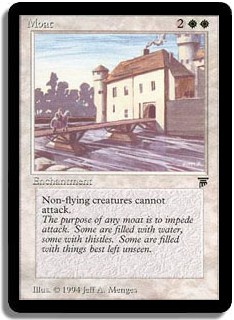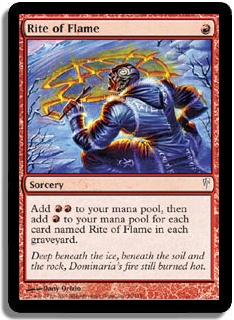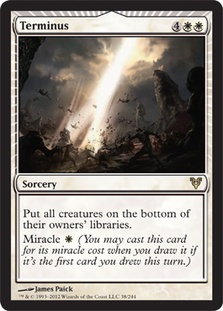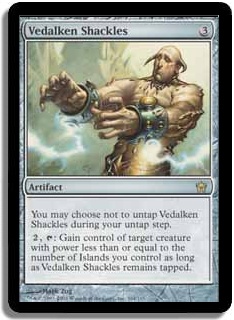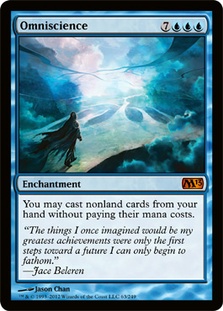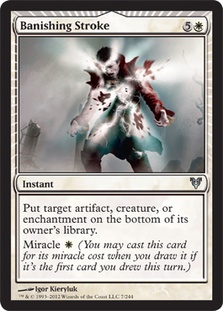Went to another GP, made it to Day 2, and missed out on the money once again—darn it. This time, though, I don’t feel as bad about myself as I did last time. I mean, sure, I once again threw away a money finish with a stupid misplay (let me give you a tip: if you’re sitting there chanting, “Don’t draw Show and Tell,” in your head against Reanimator while there is one in your opponent’s graveyard and you draw a Surgical Extraction, you might want to use that on Show and Tell instead of Griselbrand when he Thoughtseizes you), but at least I didn’t play like a total n00b for all of Day 2.
I’m getting ahead of myself here, though, so let’s start at the beginning. As far as preparation and mindsets are concerned, this GP was a mirror image of Amsterdam for me. Whereas in Amsterdam I was confident my deck was incredible, this time I was unsure of my deck choice because I didn’t really feel like I had a perfect version of Miracle CounterTop and even seriously contemplated the audible.
As such I felt rather apprehensive, which was both a good and a bad thing. The bad part is easy to point to: some frantic last minute brewing left me with a somewhat mis-built deck, which ended up costing me at least one match, possibly more. Take a look:
Creatures (1)
Planeswalkers (3)
Lands (22)
Spells (35)

I registered this deck under the name “CAB — California Uber Alles.” This deck name is one of those convoluted association games I love to use to find song titles to put on the top of my decklist sheet (Terminus->Terminator->Arnie->California, for those interested), but that’s not what you’re here for.
Some lessons to be learned from this list: don’t play Predict. We felt the need for some way to grind out a little actual card advantage, but it’s just not good enough. The deck also should have had one or two more ways to win in it, just so that you’re able to actually end control mirrors before the round time runs out and pressure opposing Jaces. A Vendilion Clique and another Snapcaster would have done wonders in that regard.
As for things the list did right, the black splash was extremely sweet all weekend long. Thoughtseize provided excellent disruption while letting me know if the coast was clear to miracle/Jace and Vindicate is much better than Oblivion Ring when some of your opponents are running Qasali Pridemage. While it is a mite expensive, it gives you a flexible tool to deal with planeswalkers, Choke and other annoyances that isn’t dead if they’re drawing nothing but creatures.
The Engineered Explosives were excellent, dealing with Mother of Runes and Aether Vial like nobody’s business, even though I also had to blow up my Counterbalance at an inopportune time (my fault, as I shuffled away the two-drop on top). They would also have been stellar against RUG (die, Mongoose, die), but I somehow managed to dodge that all weekend.
Moat just instantly killed both Merfolk opponents I dropped it against and was the nail in the coffin against many a creature deck. I’d definitely run that again as the defensive power of the rest of the deck makes it easy to get to enough mana to drop the four cost bomb through taxing counters.
The good thing about being apprehensive? I didn’t have the same overconfidence hang up I had in Amsterdam. Instead of feeling the world owed me something, I felt I had to give my best and hope the deck was up to snuff; as a result I played at least reasonably well for most of the tournament, though the autopilot and overconfidence still got me a few too many times. I don’t know why, but I always play pretty badly at GPs.
As if to support my bad feeling about the deck, my decision to ignore dedicated Show and Tell hate (aka Humility) came back to bite me during the very first round I had to play when, obviously, I ran into Sneak and Show (round 4, as I lucked into byes at our local GP Trial again). I lost game 1 due to losing the die roll (another land drop would have allowed my double Spell Pierce to stop his turn 3 Show and Tell with Daze and Force backup) and got outdrawn in a super-long game 2 when my opponent ripped his last Sneak Attack while I had Karakas in play. I knew the matchup would be tough with this configuration, though, so I can’t really complain.
I then rattled of three straight wins, including one against German Legacy celebrity Stefan Czolk of team SPOD fame, who agreed his Maverick deck had a horrible matchup against my Terminus list, to the point that he declared the mid-round deck check had finally given him a good gameplan: hoping I’d get a game loss for a misregistered deck followed by me mulliganing to oblivion because of the de-randomized nature of our decks after the deck check. Neither ensued, and I established Jace in game 2 as I already had in game 1. This was definitely the match with the sweetest banter I played all weekend; hopefully I’ll run into Stefan again at some point.
In those three matches, I threw away another game (though not the match) against a very friendly TES player, Rob from the Netherlands. Given my opponent mentioned after the match how much harder it is to play against someone who knows how Storm works, I feel like my game 2 mistake might be useful for some of you:
My opponent Duressed me on turn 1, taking a Flusterstorm out of my hand that also had a Top. I drew Counterbalance and Thoughtseized back after dropping my first land, seeing City of Brass, Lotus Petal, Rite of Flame, Burning Wish, and Brainstorm. So what is the right card to take here?
Well, I took the Brainstorm, as I missed factoring in the Rite of Flames when considering his outs at that point* (damn me for always playing CabalANT) and died to ten Goblins beating down when he ripped a Dark Ritual.
Luckily for me, I crushed him in games 1 and 3 anyway when I used my early disruption correctly to buy time. We discussed my game 2 misplay after the match, and once I told him I had the Counterbalance in hand he agreed I should have taken the Wish. Rob was a pleasure to talk to, and we discussed my experience with CabalANT and why I prefer it to TES. He also ended up making Day 2.
*If I take Wish, he has four draws to find one of one-to-two Ad Nauseams, three Burning Wishes, four Infernal Tutors, or his maindeck Empty the Warrens (pushed it with Jace game 1) plus any one of his accelerators (roughly nine outs in four cards assuming he finds one of the million accelerators TES has). If I take the Brainstorm, he has one draw to find exactly Dark Ritual or Lion’s Eye Diamond (eight outs, one card drawn)—that is if you ignore he’s running Rite of Flame (eleven outs). I think taking the Burning Wish is correct there.
My next loss came down to a slight misplay in round 8, when I flipped my Top needlessly and ran it straight into an otherwise useless Spell Pierce that I’d been playing around for quite a while at that point. This led to me finding business a little too slowly to ever establish a position to move forward from instead of treading water. In the end, I got killed by my opponent’s Vendilion Clique (his last win condition with Moat in play) when he had drawn his whole deck in a very sweet forty minute game. The game started with heavy Stoneforge aggression; I only managed to stabilize on two life, followed by me getting out from under a Jace that had been sitting in play for four turns and both of us trading resources left and right.
I just love these kinds of games: long, drawn-out, grindy fights in which mistakes are punished ten turns down the line. The better player won, something that was a theme during the weekend and the reason Legacy is so awesome.
Going into the last round with two losses already, I felt the pressure and was happy about it; if the pressure is high, I usually manage to avoid making stupid mistakes (not always, though—see the beginning). When my opponent opened on Forest, Llanowar Elves, I felt pretty good about my chances to make Day 2, and Counterbalance, Moat, and Terminus made short work of him. Hugely relieved to get the chance to make up for my Amsterdam screw up, I went back to the hotel to get some sleep before hitting the site again at 9 AM on Sunday.
Before leaving, though, I heard Simon Goertzen had brought Omniscience combo along the lines of what I suggested here to the event and was tearing up the tournament. Having a deck I came up with in addition to Terminus Control do that well was the cherry to top of the day.
After a good night’s sleep, I felt calm and confident entering round 10, which is never a good thing for me. It didn’t really matter, though, as this was the one round I actually lost to variance and not my own bad play, even though, true to form, I made mistakes as soon as I felt good about myself.
I kept a one land, Top, Counterbalance, Brainstorm, double Swords hand, deployed my Top, and never found another land before turn 4. Given my opponent was playing Stax, had Chalice on turn 1 and Smokestack on turn 3 followed by Crucible of Worlds, I wasn’t really in this game anyway. Game 2, I mulliganed to four looking for at least a single land, and my opponent ripped turn 1 Trinisphere, turn 2 Smokestack off the top of his deck (as he so nicely told me). I remained locked under Trinisphere for the rest of the game; Smokestack number two took over for Smokestack number one once I was at zero permanents and started redeploying lands. I still let him play it out, and he thanked me for giving him the option to actually end a game for once. Magus of the Tabernacle beat me down while he brought himself to six life, all with his own Ancient Tomb.
The next round might have gone better had I not realized this had actually been bad luck, as my opponent’s first turn Hierarch made me overconfident again (Maverick is such a good matchup). I did my best to throw all three games away, but the raw power of Entreat the Angels pulled out game 1. I wasn’t as lucky games 2 and 3, losing one due to not sandbagging my Terminus long enough and the other because I didn’t play around Elspeth, if my memory serves correctly.
After that, I finally had my back against the wall and started playing some reasonable Magic. I easily dismantled Belcher in two games. In both games, I had an opening hand with Force of Will as well as early Counterbalances that lead into Jaces. I also had one of the sweeter experiences of the tournament when he recognized me and told me he enjoys my articles—it felt good to get praise, so thanks Arnaud!
After these games, I recognized Simon Goertzen and introduced myself, curious to find out if he had come up with the deck independently or actually seen my article. I found out he had seen the list but then reworked the idea himself. I warned him I was still playing in the tournament when he offered to discuss the changes he’d made and as we were both on four losses at this point, we decided to postpone that particular discussion.
Afterwards, I crushed Merfolk twice; once thanks to a timely Island of off Top to get my Shackles to grab his Coralhelm Commander, though I still managed to throw away a game by shuffling away the two-drop that locked him out of playing spells (leading to me EEing my own Counterbalance).
After the second match against an enjoyable and competent Finnish player, we discussed his deck for a while, and he revealed the awesome tech that is Tidal Warrior. Instead of having Spreading Seas in the board, you get another warm body to pick up Lord bonuses, and against non-blue decks you can give your opponents some Islands to walk through starting game 1. Those Finns definitely know their Fishes… (I can hear the tada sound already; forgive me for causing you headaches with my sense of humor.)
Sadly, I buried my hopes of actually making Top 64 next round by doing the brilliant Surgical Extraction move alluded to in the beginning of the article. I guess fatigue and constantly looking at the round time caught up with me, engaging the autopilot. Despite all that, the match was a good one. My opponent, Loic Le Briand, was a fun opponent and clearly knew what he was doing—unsurprising, as he made Top 8 of GP Lille, the very first European Legacy GP. Congrats on making Top 64 this time, Loic. At least you made something out of beating me, as I told you to.
With some time left in the round, I finally caught up with Simon again—now with someone German next to us to remind us that we were both German and didn’t need to speak English to each other—and we discussed what he had done to the list. I have to say, he fixed a lot of the issues I found in testing. Here is his list in all its glory for those who haven’t seen it yet:
Creatures (4)
Planeswalkers (2)
Lands (20)
Spells (34)

He and Florian Koch changed the counter package to all free counters when they realized in testing that they never wanted to keep mana open or would need it to pay for all the taxing countermagic in the format anyway, which makes quite a bit of sense. I also enjoy the secondary Living Wish into Emrakul win condition in the sideboard in addition to the Petals of Insight as otherwise Gaddock Teeg and Thalia shut you down, which is not a good problem to have.
The Jaces are something I’ve been trying out in the deck, too, and they’re incredible. Dropping a turn 3 Jace is pretty ridiculous, and he even helps find something dumb to do under Omniscience quite well—he’s Jace, after all. He also hilariously allows you to keep bouncing and recasting your Emrakul should one attack not be enough. That’s pretty sweet.
I’m not 100% convinced the Emrakul/Griselbrand split is correct in the maindeck, but there are a number of situations in which Emrakul can shine when Griselbrand doesn’t. It’s nice that you now have six instant wins to draw into under Omniscience after casting a Griselbrand instead of just the four Wishes, but the most important advantage is that Showing in an Omniscience with Emrakul in hand actually beats Qasali Pridemage, while Griselbrand might still fall short.
It definitely led to one sweet line of play he told me about: Simon was playing with an Emrakul in hand while his opponent had Karakas in play and Force of Will in hand. When Simon found a Show and Tell and cast it, his opponent let it resolve eyeing his Karakas, only to feel very foolish when Simon deployed his freshly topdecked Omniscience, hard cast, Emrakul and casually crushed the Karakas.
Excellent work, Mr. Goertzen; it was nice talking to you.
After this, I decided to play out the last round (because mise) and promptly looked foolish when my reaction to seeing a female opponent was to recheck the pairings. I didn’t remember seeing a female name on the pairings sheet, and ever since I lost a match due to being at the wrong table, I check my opponent’s name before getting seated. (Neither of us realized, and we played a match that wasn’t meant to happen, while my real opponent got a bye that round because I didn’t show up.)
Turns out I’m just too dumb to read, and we were both in the right spot. I wish I could say the match was loads of fun for both of us, but she turned out to be playing Elves. That matchup isn’t really much fun to play out. You Terminus away their early game, and once you establish CounterTop, you mainly sit around churning the Top to finally find something to win with while your opponent is reduced to staring at your lock and doing nothing aside from trying an occasional Green Sun’s Zenith that usually runs into your regular countermagic.
After that last round, I saw Raphael Levy dismantling his deck and remembered reading an interesting article by him discussing a U/W CounterTop Miracles list inspired by the one Shawn French brought to the SCG Open Series. Given that Shawn’s deck was based on my Terminus article, I decided to ask him if that’s what he had been running. He confirmed, and we set to discussing the deck a little bit, with him warmly recommending I try out Banishing Stroke in the sideboard as it had served him well as a cheap answer to Choke. Endorsement by a Hall of Famer—a very friendly one no less—is a pretty strong argument, and you can be sure I’ll be dropping one of these into my board for future testing sessions.
One thing I was particularly happy to hear was that the deck had totally changed the way he felt about Legacy. Before, he disliked the format because there was no deck he actually liked, but now that he had one he felt was awesome, he enjoyed the format immensely—sweet! As he broke the Top 64 barrier, he will likely write about the deck again—or so he said—and I’ll be on the lookout for that article. I expect a good read.
And that’s how my personal tournament ended, though I spent the rest of the evening watching the Top 8 and shouting, “Tendrils!” as CabalANT finally took home a long-deserved trophy. I told you the deck was a monster. Congrats, Timo!
Needless to say, watching all those Ritual chains gave me the itch to pull out Past in Flames again, though I’m probably going to be running the Grim Tutor version still; the Wishes create too many red mana bottlenecks for my liking when going off early. Probably something like this:
Lands (15)
Spells (45)
- 1 Tendrils of Agony
- 4 Brainstorm
- 4 Cabal Ritual
- 4 Duress
- 4 Dark Ritual
- 1 Grim Tutor
- 3 Cabal Therapy
- 4 Lotus Petal
- 4 Lion's Eye Diamond
- 4 Infernal Tutor
- 4 Ponder
- 1 Ad Nauseam
- 2 Preordain
- 4 Gitaxian Probe
- 1 Past in Flames
Sideboard

The maindeck is still the same I advocated last time, but Timo’s sideboard Dread of Nights impressed me very much in preliminary testing. They’re an excellent answer to Thalia; cheap enough to easily cast through said Thalia and if you can set up two of them, hate bears stop being an issue at all. That is pretty fantastic simply because with the three-mana sweepers I’ve been running, you both kill yourself more often with Ad Nauseam and you sometimes have to pass the turn after sweeping the board, only to see another hate bear hit the field.
After the finals, we went back to the hotel where I instantly started jamming some games with Storm again and took an uneventful flight home to Berlin the next day.
There you have it: my GP Ghent experience in roughly 3000 words. I hope you enjoyed this at least half as much as I enjoyed my trip to Belgium. Until next time: play the game, see the world, and meet a ton of nice people! Oh, and Teeeeendrils!

